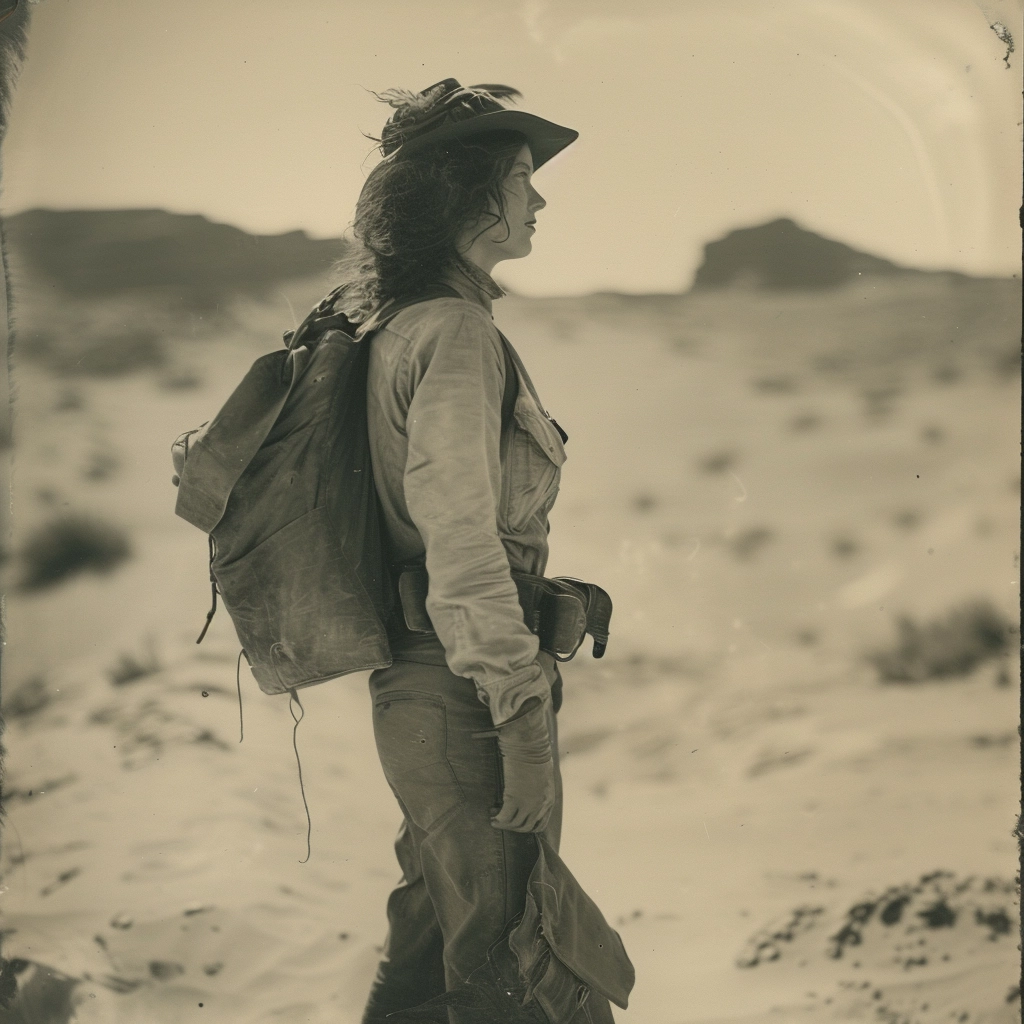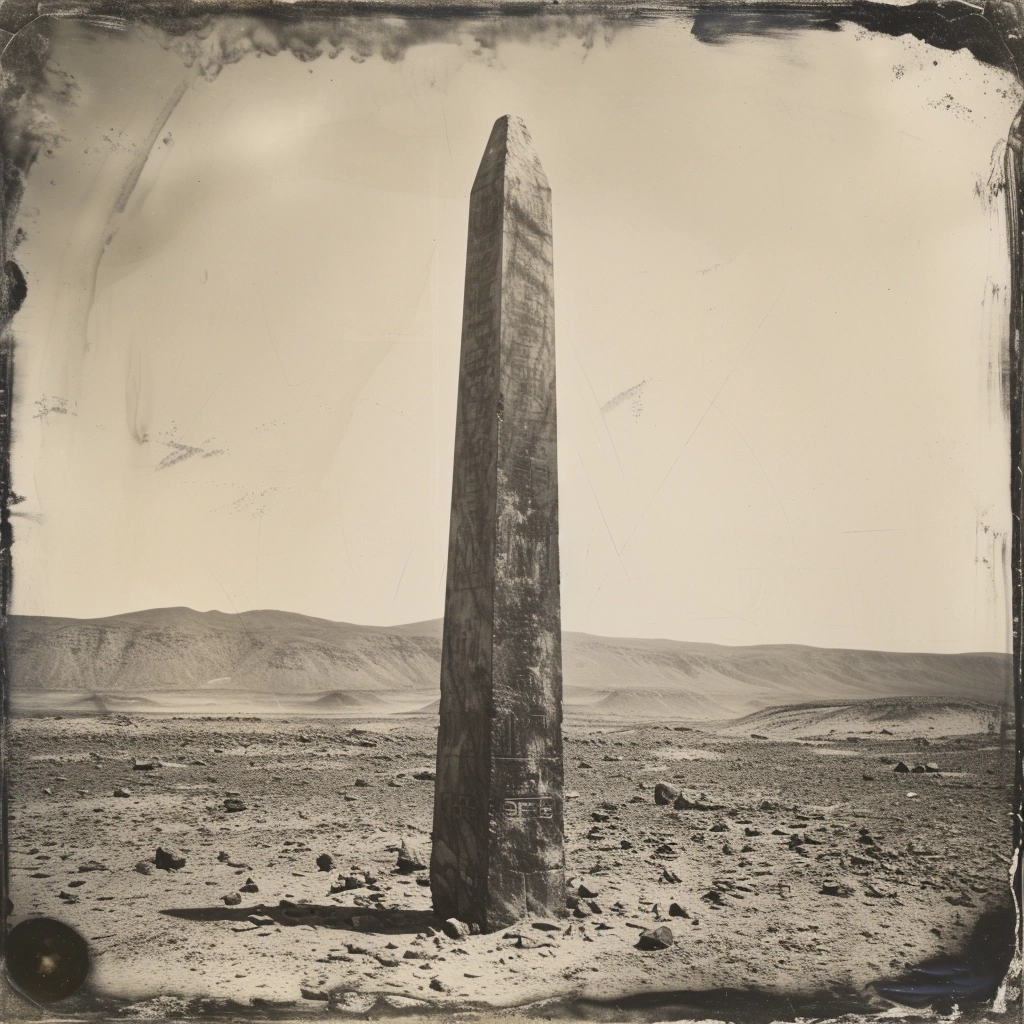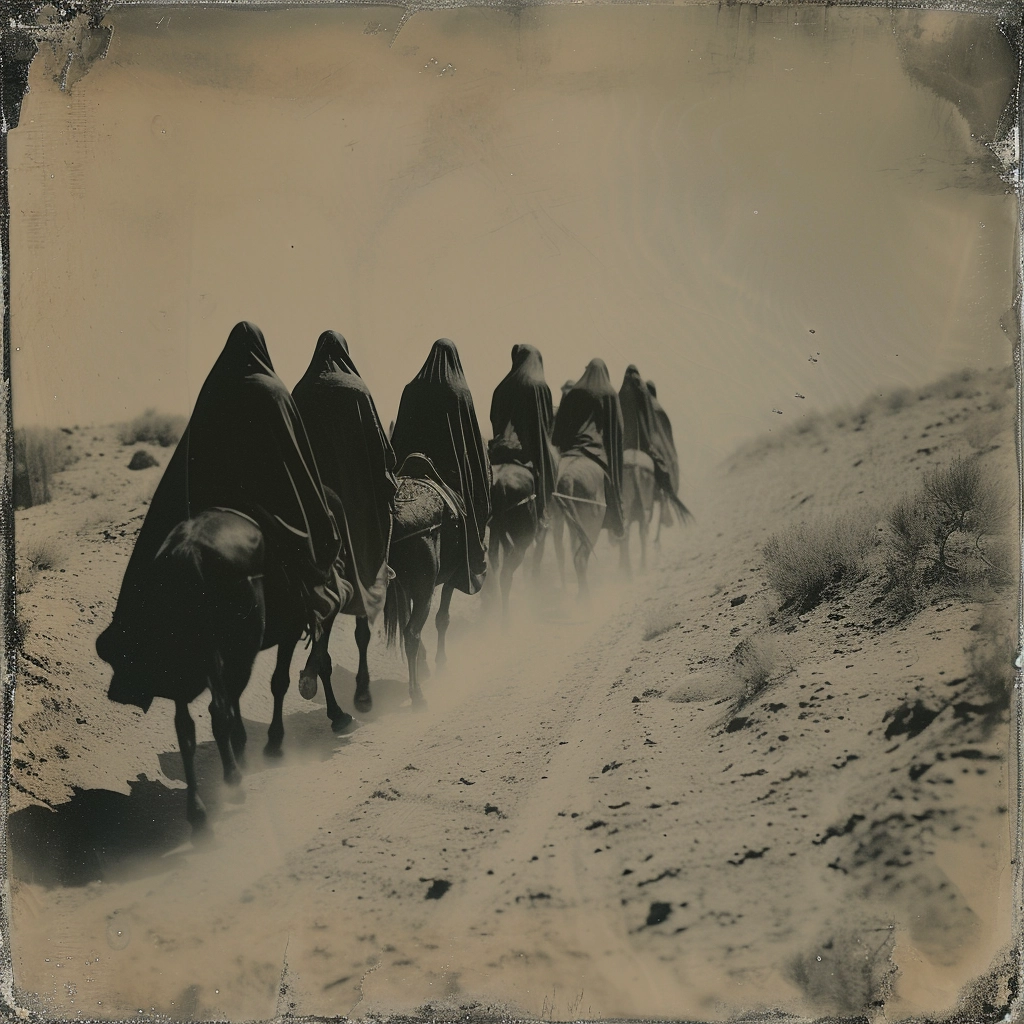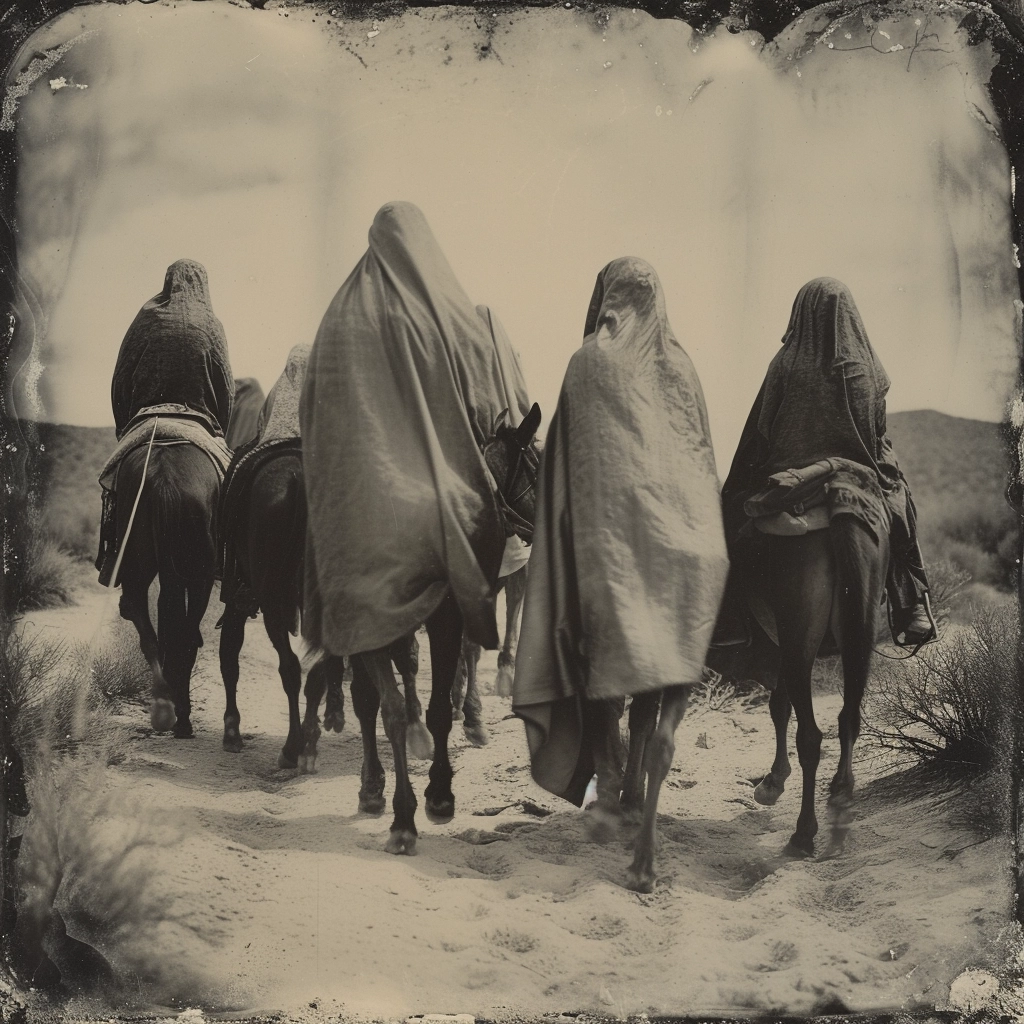BEATRICE THE SIXTEENTH (1)
By:
February 26, 2024

Beatrice the Sixteenth: Being the Personal Narrative of Mary Hatherley, M.B., Explorer and Geographer (1909), by the English feminist, pacifist, and non-binary or transgender lawyer and writer Irene Clyde (born Thomas Baty) introduces us to Armeria, an ambiguous utopia — to which we are introduced initially without any firm indications of its inhabitants’ genders. HiLoBooks is pleased to serialize this ground-breaking novel for HILOBROW’s readers.
BEATRICE THE SIXTEENTH: 1 | 2 | 3 | 4 | 5 | 6 | 7 | 8 | 9 | 10 | 11 | 12 | 13.
THE DESERT
Desert so far as the eye could reach. Only, on the skyline, a tuft which might be a clump of palms. Overhead, the sun industriously burning up everything visible.
I raised myself on my elbow and looked round. Then I remembered what had happened. The blow from the camel’s hoof had stretched me senseless. Of course I remembered. But where was my Arab escort of the morning? And who were these unknown figures standing round me?
My first thought was for my revolver. But it had disappeared. Nor was it possible to think of flight from the surrounding assemblage.
So I spoke to them in Arabic. Who were they? Where was my escort? How far was it to Wady Keirân? Were they friends? None of them answered, and they talked among themselves in a tongue which was certainly not Arabic, nor Turkish, nor Persian. Who were they, these clean-shaved, fair, smiling people all in kilted brown robes with a broad yellow stripe across the front? It was useless to speculate. The nearest to me proceeded to make signs in the burlesque manner of those who are not accustomed to it, and it was clear enough that the party wished me to proceed with them. There was, indeed, nothing else for it. I joined the caravan, only too thankful to be in no worse company. A smile is a sign of good intentions all the world over.
Most were walking, of the twelve or fifteen who made up the party. A few pairs of mules supported full baskets between them, and some of these had riders. Science asserted her sway, and I endeavoured to find out something about the language spoken by my companions. Addressing myself to a tall, striking-looking personage, with a profile like an old cameo of Odysseus which once hung near my fireplace in a Surrey house — far away now — I began to acquire a few nouns and verbs. But my education had not proceeded far when night overtook us, and the caravan prepared to bivouac.
I know no more of what happened that evening, for sleep came suddenly and irresistibly, and I sank into the folds of a rough, soft rug, as a child nestles into its pillows.
By early morning we were moving. But the palm-like tuft on the horizon grew no nearer after three hours of steady walking. We halted for a meal of flat cakes and excessively sweet wine, and proceeded on our way, a seat being found for me in one of the mule-baskets, for my head still ached violently. Gradually I fell into an uneasy dose, with that accompanying sensation of uncertainty and danger which is so disquieting when one sleeps on a journey. I could have felt certain once or twice, in a dreamy way, that something had passed my lips. But I wakened fresh and alert towards evening, when I found no preparations for resting, but the whole company steadily pressing on. There must have been a halt during the day to enable them to walk as they did. For myself, I lay down in my capacious basket, wrapped my rug more closely round me, and watched the moving figures in the bright moonlight, until a deep, restful sleep came upon me, which lasted until morning.

And then I saw the explanation of the palm-like tuft against the sky. There towered before us a magnificent obelisk, the very base of which was; the size of a palace. Perfectly simple, its entire plainness had a unique and lonely grandeur. Its solemn finger, as we neared it, pierced more and more into the blue. It was the discovery of an eighth wonder of the world. But how had it remained so long for unsuspected in solitary majesty? As I thought of the generations of Arabs who must have so well guarded the secret, of the many explorers who must have passed within an ace of finding it out, I could not repress a smile. The impulse was infectious. The kindly faces of my conductors beamed with pleasure, and the very mules seemed to start with fresh energy.
I soon saw why. Seven or eight miles away, so far as I could judge, appeared the serrated edge of a low range of hills, towards which we were evidently directing our course, to everybody’s high satisfaction. An hour’s further journey, and the stony desert melted into fresh green pasture. Feathery-topped, graceful trees appeared; the scorching heat itself gave place to a pleasant coolness; one caught sight of figures moving behind the foliage, and paddling light craft past the rushes. Finally, we stopped at two huts, for no reason that appeared. Here there came out to us the most surprising ostlers that, of many strange beings, it had been my lot to meet. Tall, lithe, brown, with a swinging step and a free carriage — so far they were commendable, but not uncommon. The singular thing to me then was their extreme beauty, and the fact that everyone of them was clothed in ivory silk, of a perfectly Grecian fashion.
These remarkable personages performed our mules’ toilet, watered and fed them, and offered us various kinds of fruits and honey, which most of my companions were nothing loath to accept. Still, when all was disposed of, and even conversation flagged, we waited on. It occurred to me that some of the white-garbed people might know a little Arabic, and as I was increasingly uneasy as to my whereabouts, I selected a particularly intelligent looking subject to inquire of. But my inquiries were met with a bland stare of regret, and a minute later with a response delivered with a stately kind of diffidence, as though the speaker thought it right to answer, but hardly expected to be understood. Nor did I understand for a while, but some familiar chord in my memory was set working. Bits of old school day learning came back to mind, and as the strange people chatted with each other, I knew that their speech was a near relative of Latin, with a strong infusion of an element more resembling Greek. The blood rushed to my head — I could understand them; I could speak to them!
Only the first and third declensions and conjugations were used. The words were not spoken according to any modern system, though very nearly as in the Italian method. And to those broad vowels for classical speech I was well accustomed from days long past, when I had pored over Cicero and Horace, with some big Scottish cousins in a Dumfriesshire garden. When shall I ever forget those old Dumfriesshire mornings? The low, incessant undulations of the mossy, bent-covered earth; the damp pools; the distant mountains; the silver Solway, shining far away like the glint of its own salmon! And inside the red-brown walls of the garden, a tangled a maze of larkspur and snapdragon and marigolds, and a dozen more flowers whose names we did not know, nor cared to; for we three were in the Senate watching Cataline, or listening with Plato to the last words of Socrates.
“Ulinde venitis?” The words forced themselves to my lips, and no sooner were they spoken than there ensued a most laughable scene of confusion, everybody joining immediately in animated colloquy, difficult from its rapidity to understand — the more so as my first friends did not speak the Italo-Greek dialect among themselves, but a language entirely different and totally unintelligible. And, besides, the traveller I addressed, after a sharp turn with an emphatic nod to a neighbouring muleteer, began to reply to my questions. The pronunciation was not quite easy to follow, but in a few minutes I had made out that my acquaintances were merchants, bringing country produce to town across the desert, and escorting travellers, who had business or other engagements in the city. Of these there were five or six among their number.

The city, they said, was large and populous, though its extent seemed to me exaggerated; still, I knew the wide area an Eastern city will cover. The people were engaged in trade and in manufactures, so far as I could gather; they were acquainted with the arts, and were hospitable to strangers. But when I inquired their relations to the Turkish authorities and to the desert tribes, the most impenetrable density met every question. “Arabes,” “Syria,” “Alexandria,” “Parthii,” and “Nilus” — a shake of the head met every reference to these, and the eyebrows would rise inquiringly and innocently, without a quiver.
“It is all very well,” I thought to myself; “our excellent friends have reasons, doubtless for keeping their own counsel as to their knowledge of the world and the best thing I can see at present is to humour them.”
Accordingly, I waived the delicate subject, as I inferred it to be, and proceeded to inquire, what was my next point of concern, how they had come across me. But I did not succeed in obtaining the least clue to my position. They had stumbled on me lying absolutely alone, and had not been much surprised, as travellers were frequently found to be overcome by heat or weariness, and for this reason generally availed themselves of the merchants’ escort, and travelled in their company.
“And were you not struck by my odd appearance? Had you ever seen a European before?” I asked.
No; they were well aware that foreign nations had each their own customs. Very likely their own seemed absurd to strangers. I glanced at the ivory silks, and then at my own tailor-made garments, and I hardly felt the comparison justified their surmise.
I changed the subject. What was the name of the great obelisk we had passed? Was it on a bird, then, they said, that I had ventured to cross the Stony Desert, without knowing the use of the Index Maxima? If my guides had abandoned me without explaining its use, nothing could be bad enough for them. Words failed to express the hopelessness of the position in which they must have left me.
“But I was not intending to come here; I was going to Wady Keirân,” I explained; whereat, the polite stare of incomprehension again and an awkward silence. I would have inquired the name of the city, and how far we were distant, when two horsemen came briskly up, and were at once surrounded by the travellers. These five new arrivals were well armed, but, so far as I could see, not with rifles. They were certainly nothing like Bedouins; for one thing, although they rode easily and well, they had not the air of being constantly in the saddle. Their long dark cloaks covered their dress, but the metal helmets which they wore had so classical an appearance that I half expected to see them arrayed in corset and lorica, like a Roman eques. Their real attire, however, turned out to be a much simpler dress; and the idea faded which for a moment had possessed me — that these people were the relics, preserved like flies in amber, of some Romano-Syriac civilisation. Still, I was no nearer as to what they were.
The newcomers scrutinised carefully all the members of the caravan, and continually referred to parchment rolls which they carried with them. They talked for some time to the principal spokesman, with an air of friendly authority. Suddenly the young looking of the two dismounted, and came swiftly, but quietly and naturally, to where I was standing.
“Let us sit down and talk whilst matters are being arranged.” My arm was taken, a pair of eyes looked into mine, and I found myself resting on the spicy herbs with a hospitable figure beside me.
“You see, we generally require strangers to be provided with credentials before they are admitted into Armeria. Otherwise, they have to spend sometime in quarantine outside the gates before they can be let in, so that we may make inquiries about them; but I am expecting that, you being evidently from very far away, and having hurt yourself and — and — needing care, we may take you in without waiting. (Can you understand me? I am afraid I speak too fast. No?) Have you friends in Alzôna?”
I explained that I had no intention of visiting Alzôna, and that where I wanted to be was Wady Keirân. Much, therefore, as I desired to see the beauties of the city in question, I would not think of the laws being stretched to enable me to do so, and would be much obliged to be put in the right track as soon as convenient.
An impatient movement of the graceful figure, otherwise so courteous, warned me once for all to give up speaking of Wady Keirân. “You will come to Alzôna first,” was the persuasively uttered reply. “There are doctors there, and — I hope I haven’t been rude!”
Well, if people thought me a lunatic, at least protem. I must just make the best of it. Very likely I should be no worse off by going. And the voice in my ears was very persuasive, and, I began to realise, very sweet.
I thought I would take the edge off my presumed lunacy by a little rational conversation on the subject of the Index Maxima.
“When was it built?” I said. “And why do you not use the compass?”
“Everybody hasn’t got a compass,” was the laughing reply. “And sometimes it is dark; then, you know, the light shines from the top, when you could not see a compass-card without a fire. But the obelisk was built five hundred years ago. Without it, we could have scarcely any intercourse with Zûnaris — and no figs.”
Five hundred years! How easily traditions are distorted! The monument must have been five thousand years old.
A shout from the crowd, however, recalled us at this moment to the huts, in front of which the train was duly marshalled to proceed. A horse was found for me, and I noticed that it was kept carefully between those of the newcomers, who brought up the rear of the procession. For a few minutes we passed through a belt of trees, and then emerged on a plain, across which, not half a mile away, rose a solid mass of buildings, whose square towers hung over long ranges of battlemented wall and rows of pinnacled rampart. The material of which it was constructed seemed to be a dark grey stone, so far as I could judge at the distance. On the first glimpse of it, the merchants showed the liveliest signs of pleasure, pointing to various features of the place, and talking volubly to each other, with considerable urging of the mules.
“That reminds me,” I said, “of the scene there was when I first spoke to your countrymen.”
“They had been debating greatly,” the elder horseman replied, “as to whether you were a native of some civilised country or an outer barbarian. Your clothes, they thought, argued the latter, though” — politely — “every nation pleases itself; but your manners were, of course, not those of a barbarian. As they are inveterate lovers of an argument, and argue all the more to prove themselves right the more clearly they are shown to be wrong, your knowledge of our language started the game afresh; and if we had not come, they would certainly have been disputing now.”
“Then, they are not of your own race?” I observed. Here the younger horseman struck in: “I hope not! Good creatures they are; and, for all their arguments, they never quarrel, which, they say, spoils the zest. Still,— of our race!”

“If you are such a stranger,” said the other, in explanation, “you do not, perhaps, know that Alzôna is the capital of a State, say eighty by one hundred miles in extent; that the kingdoms of Uras and Kytôna lie next it on the east, and a series of little States — we call them the Mountain States — on the south, together with the Hyroses Mountains. Then, on the west are Cryosis, Agdalis, and Cranthé; beyond them, others for a thousand miles. Eastward, past Uras and Kytôna, there are others too, but they do not reach so far. And these States are a group by themselves, so that for any stranger to come from outside their limits is a novelty indeed. Only we have these merchants, who come to us from Zûnaris; and the people of Orôné, far to the west, make voyages to sea. For the rest, the desert and the mountains form impassable barriers — or, at least, there is no temptation to cross them.”
I could not believe my ears. A kingdom eighty miles square, here! It was simply impossible. As for the other countries, they must be distorted versions of the well-known divisions of the map. The sea to the west was natural enough. And I did not doubt that the geographical ideas of these people were considerably confused, and far from being anything like as accurate as Strabo’s, say, or Ptolemy’s. But a kingdom eighty miles square!
Still, there was the mass of buildings before me.
“And how are you governed in your city?” I proceeded.
My companion’s head was thrown back a little.
“We are free,” was the answer.
“But is there no Sheikh, Consul, Decemvir, at the head of things?”
“Yes, certainly. We have our queen.”
“And who is she?”
“Beatrice the Sixteenth.”
A dynasty in this out-of-the-way comer of the globe, then! And probably a more or less veneered version of an Oriental Court.
“I do not know,” went on the elder of the riders, “whether you have queens in your country. But our line has lasted, as history tells us, seven hundred years, when the royal family of Uras first gave us a sovereign. And now we are not the best of friends with Uras.”
“I hope you are not bound for Uras,” said the younger horseman abruptly.
“On the contrary, nothing is farther from my wishes,” I returned, though I had qualms of conscience, for I did not know but it might turn out that Uras was Persia, or Bassorah, or Aleppo.
“Uras has behaved disgracefully badly; they are not treating us rightly—” But a sign from my right-hand neighbour checked the political confidences which were impending.
Just then a sight presented itself which for a moment did not strike me in its full significance, but which immediately began to produce in me a sensation of bewilderment, culminating in a physical shudder.
Before us ran, in placid flow, past the now imminent walls of the town, a river, which was spanned by a fine stone bridge, and whose waters were broad and deep.
Wild surmises crossed my mind. An affluent of the Tigris? An arm of the Persian Gulf? The Euphrates? I knew perfectly well that all these were impossible. A river where no river could be, it seemed. I did not notice the boats on its surface, nor the vegetation on its banks; my agitated thoughts made me dizzy. With an effort, I refused to dwell on them. Feeling very much like bidding farewell to Europe forever, I watched the caravan file over the bridge. The two youngest travellers; the mules, in pairs, with their drivers; the merchants, with their staves, in stately order; the other travellers who accompanied them; we three on horseback — so we moved on to the causeway, and ended the last furlong of our journey.
RADIUM AGE PROTO-SF: “Radium Age” is Josh Glenn’s name for the nascent sf genre’s c. 1900–1935 era, a period which saw the discovery of radioactivity, i.e., the revelation that matter itself is constantly in movement — a fitting metaphor for the first decades of the 20th century, during which old scientific, religious, political, and social certainties were shattered. More info here.
SERIALIZED BY HILOBOOKS: Jack London’s The Scarlet Plague | Rudyard Kipling’s With the Night Mail (and “As Easy as A.B.C.”) | Arthur Conan Doyle’s The Poison Belt | H. Rider Haggard’s When the World Shook | Edward Shanks’ The People of the Ruins | William Hope Hodgson’s The Night Land | J.D. Beresford’s Goslings | E.V. Odle’s The Clockwork Man | Cicely Hamilton’s Theodore Savage | Muriel Jaeger’s The Man With Six Senses | & many others.
